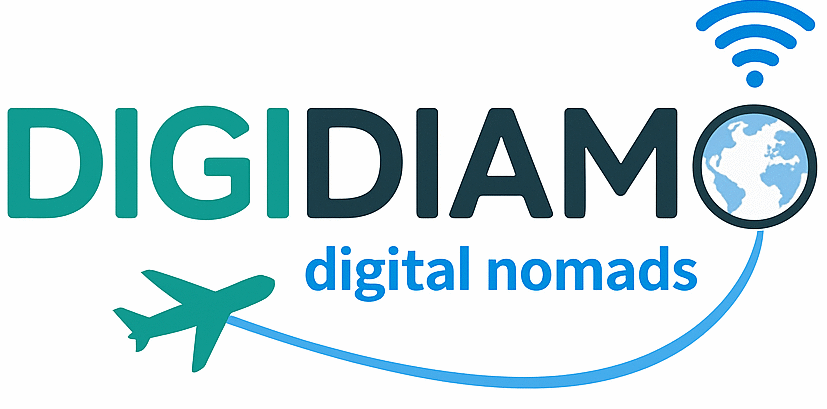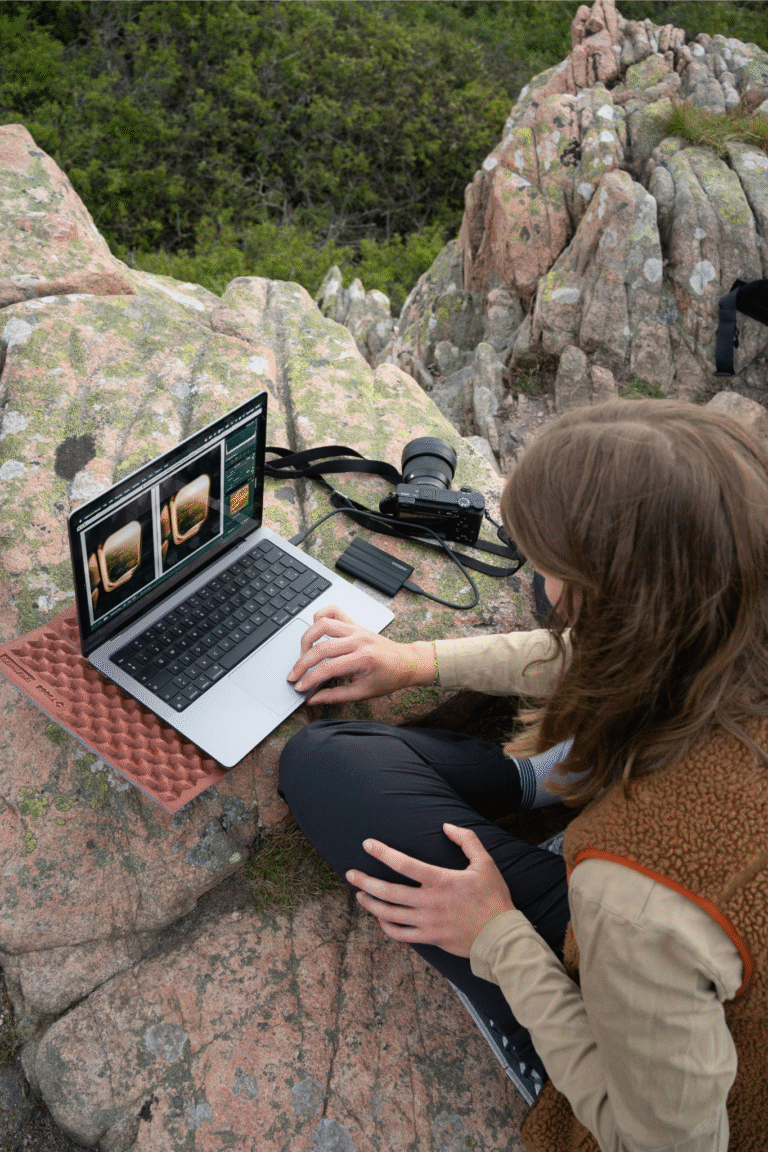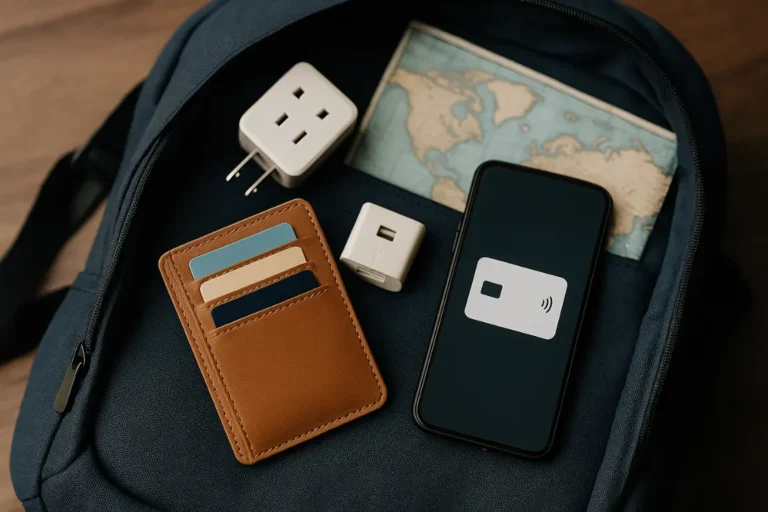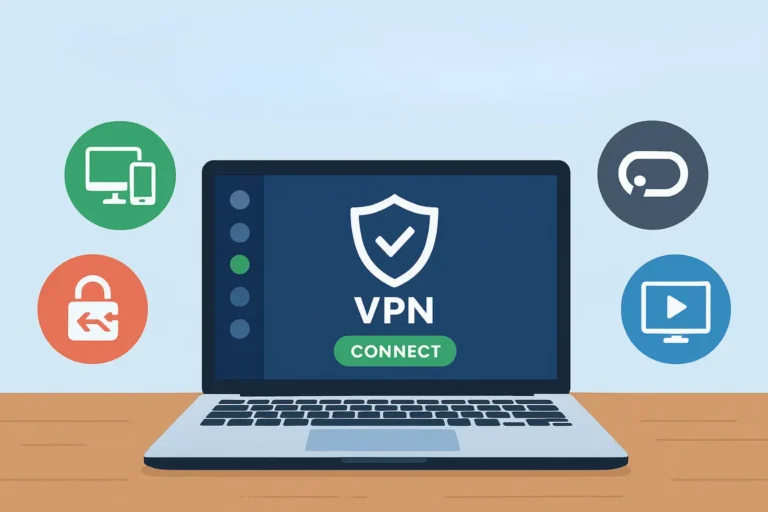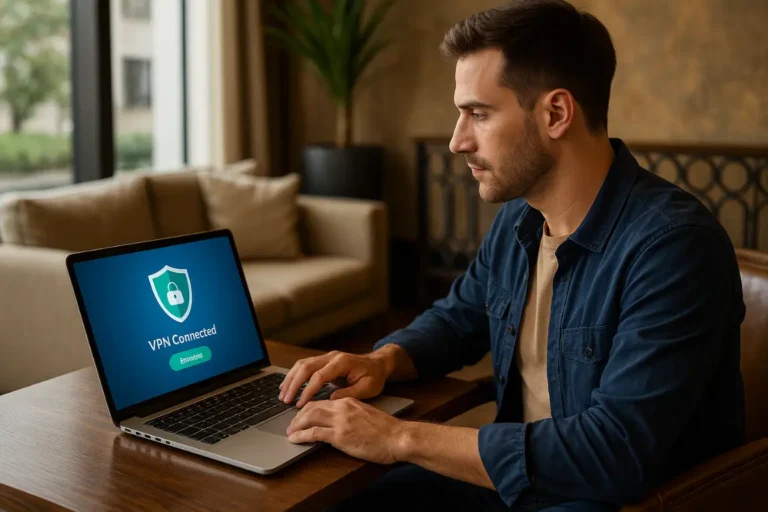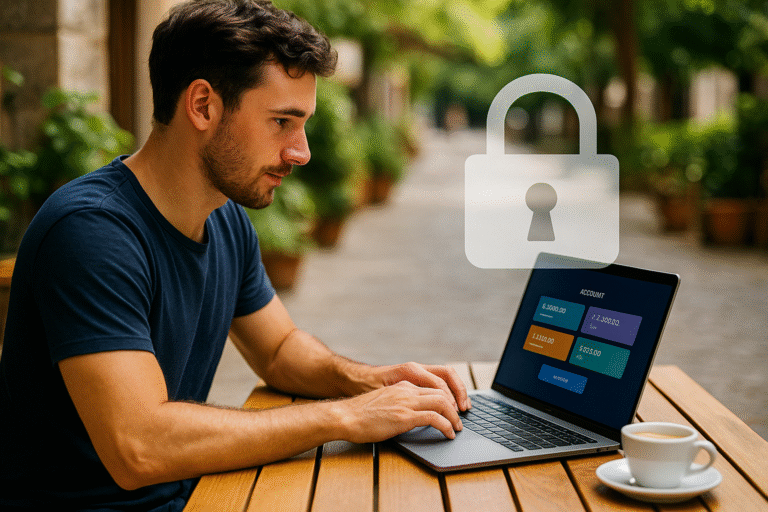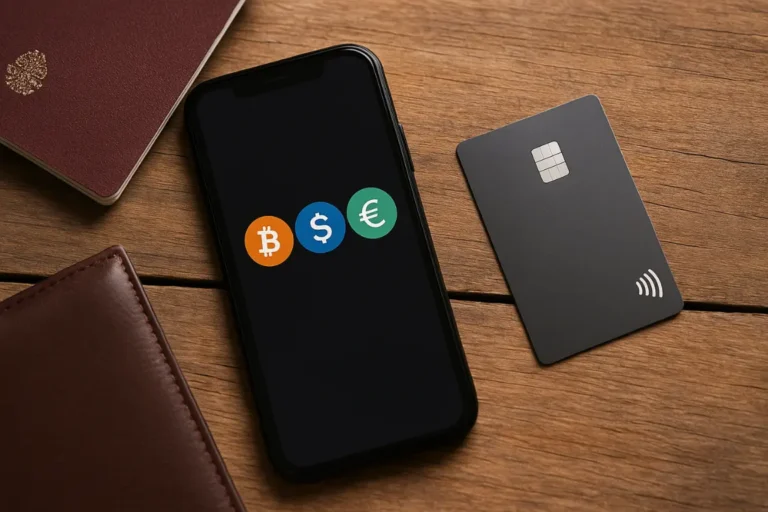VPNs for digital nomads: the complete 2025 guide to staying secure and connected
Introduction
Life as a digital nomad is built on movement. One month you may be working from a sunny terrace in Lisbon, the next you’re taking calls in a café in Bangkok. While this freedom is exciting, it also brings unique challenges. The internet is your lifeline to work, clients, family, and entertainment, but it isn’t always reliable or safe. Public Wi-Fi is often unsecured, banking apps get suspicious when you log in from abroad, and streaming platforms change content depending on your location.
This is why a VPN, or Virtual Private Network, becomes an essential tool. It secures your connection, hides your location, and unlocks services across borders. More than just a technical gadget, it’s a way to keep your online life stable as you move from one place to another. In this guide, I’ll share how VPNs work for digital nomads, the features that matter most, and the best options available in 2025.
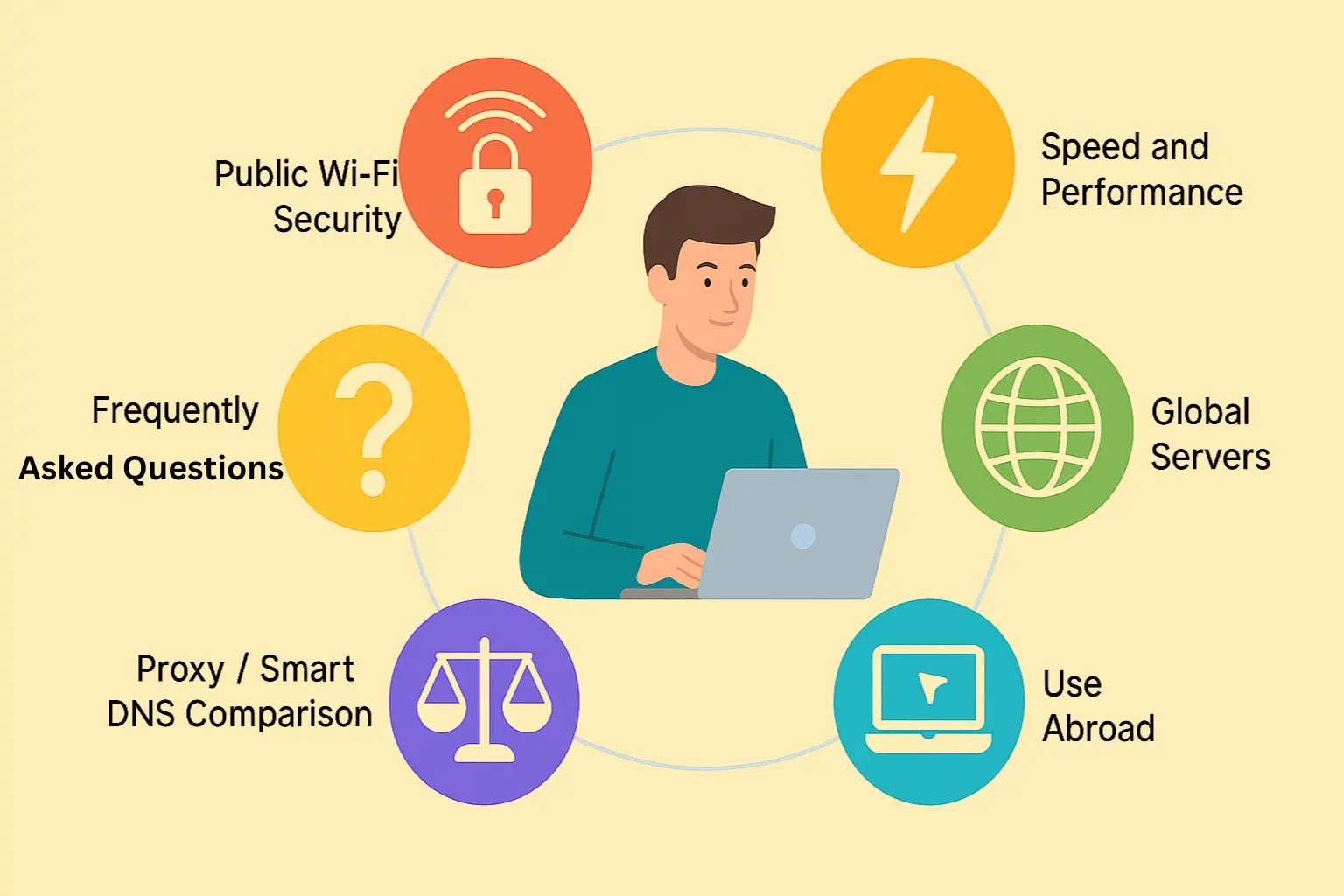
Why every digital nomad needs a VPN in 2025
Working remotely means relying on internet connections you don’t control. Airports, hotels, and coworking spaces all provide access, but they often leave networks open to risks. A VPN protects your data by encrypting it, which makes it unreadable to anyone who tries to intercept it. For a lifestyle that mixes travel and constant online activity, this protection is priceless.
The main reasons nomads turn to VPNs are:
- Security on public Wi-Fi: Shared networks are easy targets for hackers. A VPN creates a private tunnel between you and the internet.
- Consistent access: Many countries restrict sites or services. With a VPN, you can connect as if you were back home.
- Streaming freedom: Services like Netflix or Disney+ change their catalogs depending on where you are. A VPN lets you access content from different regions.
- Banking and payments: Logging in from abroad often triggers security alerts. Connecting through a home-country server avoids many of these issues.
- Better travel deals: Some flight and hotel sites show different prices depending on location. Testing different servers with a VPN can reveal cheaper options.
These benefits aren’t just theoretical. I’ve personally booked cheaper flights, streamed shows from home, and kept projects safe while working from cafés, all thanks to using a VPN. If you want a closer look at the practical side of these benefits, read why every digital nomad needs a VPN in 2025.
Top VPN features digital nomads should look for
Not every VPN is built the same. Some services focus on speed, others highlight privacy, and a few keep prices low by limiting features. For digital nomads who depend on stable, safe, and flexible connections, choosing the right features makes the difference between a smooth day of work and endless frustration.
The most important features to look for are:
- Speed and stability: A VPN should keep video calls smooth and file uploads steady. Protocols like WireGuard or modern versions of OpenVPN usually provide the best performance.
- Global server coverage: The more countries available, the easier it is to access blocked services or appear local when needed.
- No-logs policy: A trustworthy VPN won’t store your browsing history or IP address. Independent audits or proven legal cases are signs of a real commitment to privacy.
- Kill switch: If the VPN disconnects, this feature cuts internet access until the secure connection is restored. It prevents your data from leaking by accident.
- Split tunneling: This lets you decide which apps use the VPN and which don’t. For instance, you can route your banking app through the VPN while letting a local delivery app connect directly.
- Multi-device support: Most nomads use both a laptop and a phone daily. Unlimited connections, like those offered by Surfshark, make life easier.
- Streaming access: For entertainment during downtime, a VPN that reliably unlocks services like Netflix and BBC iPlayer is a bonus.
- Customer support: Reliable 24/7 support helps when you face restrictions or connection issues in new regions.
A VPN that combines these features will serve a nomad well across continents and unpredictable networks. If you want to dive deeper into what each of these elements means in practice, explore the essential VPN features for digital nomads.
The best VPNs for digital nomads in 2025
After years of testing VPNs across different countries, I’ve learned that no single provider is perfect for everyone. Some stand out for speed, others for privacy, and a few for price. What matters most is finding the one that matches your lifestyle. If you spend more time streaming shows, you’ll want strong unblocking features. If you handle sensitive client data, privacy and no-logs policies will matter more.
Here’s a comparison of the top options in 2025:
| VPN Service | Best For | Server Coverage | Price Range (monthly) | Key Strengths |
|---|---|---|---|---|
| NordVPN | Balanced performance | 60+ countries | $3–$5 | Fast, reliable, secure |
| Surfshark | Budget and unlimited use | 100+ countries | $2–$4 | Unlimited devices, good streaming |
| ExpressVPN | Speed and global reach | 105 countries | $7–$9 | Excellent for streaming and calls |
| ProtonVPN | Privacy-focused travelers | 65 countries | $0–$10 | Secure Core servers, transparent policies |
| AtlasVPN | Beginners and simplicity | 40+ countries | $2–$4 | Easy setup, affordable |
- NordVPN is the all-rounder. It performs well in most regions, supports strong security, and reliably unblocks streaming. I’ve used it during long stays in Asia without a single dropped work call.
- Surfshark is the best budget option. With unlimited devices, I’ve shared it across my laptop, phone, and even a tablet. Its wide coverage makes it useful for frequent travelers.
- ExpressVPN offers the fastest speeds. During my time in Europe, it handled video conferences and 4K streaming without issues. It costs more, but it’s hard to match the performance.
- ProtonVPN is built for privacy. Developed by the same team as ProtonMail, it’s a strong choice for those who want transparent policies and secure servers in privacy-friendly countries.
- AtlasVPN is simple and affordable, making it a good entry point for those new to VPNs. It doesn’t cover as many countries but works well for basic protection.
For nomads, the choice depends on your priorities. If you want speed, ExpressVPN shines. If you need unlimited devices on a budget, Surfshark is unbeatable. If privacy is your top concern, ProtonVPN delivers peace of mind. For a detailed breakdown of how each one works in daily nomad life, check the best VPNs for digital nomads in 2025.
How to use a VPN while traveling abroad
Traveling introduces you to new cultures, new people, and unfortunately new online restrictions. A VPN becomes your travel companion, ensuring that your connection remains both safe and functional no matter where you land. The key is knowing how to use it effectively while moving between airports, hotels, and cafés.
The first step is preparation. Always install and test your VPN before leaving home. Some countries restrict VPN downloads, so having the app ready in advance avoids unnecessary stress. Set up your devices with saved logins, enable the kill switch, and test a few servers for speed.
When connecting to public Wi-Fi abroad, turn on the VPN before entering sensitive information. Shared networks are vulnerable to interception, but encryption keeps your traffic private. I make it a habit to let my VPN auto-connect to unknown Wi-Fi networks, which removes the chance of forgetting in a rush.
Streaming and content access is another reason nomads use VPNs while traveling. Platforms like Netflix, Hulu, and BBC iPlayer limit catalogs based on your location. With a VPN you can connect back to your home country and watch your usual shows. It also helps unlock communication tools if they’re restricted in certain regions.
For online banking and payments, a VPN can save hours of frustration. Banks often flag foreign logins, but connecting through a server in your home country makes the login appear familiar. This reduces the chance of getting locked out while abroad.
Another practical use is searching for travel deals. Prices for flights and hotels sometimes vary depending on your location. By clearing cookies and switching servers, you may find cheaper options. I’ve personally saved over $80 on a flight simply by searching through a European server instead of an Asian one.
Occasionally, VPNs face restrictions abroad. If you can’t connect, try changing the protocol or server, or contact support for updated recommendations. Reliable providers usually have dedicated teams to help travelers in such situations.
When it comes to choosing between free and paid VPNs abroad, experience has taught me that free options often bring headaches. They impose limits, slow speeds, and questionable privacy policies. Paid VPNs cost the price of a coffee per month but ensure reliable and safe connections.
Used correctly, a VPN abroad secures your work, protects your money, and keeps your entertainment accessible. For more detailed steps on how this works in practice, learn how to use a VPN while traveling abroad.
VPN vs Proxy vs Smart DNS: what works best for digital nomads
On the road, digital nomads often hear about different tools for bypassing restrictions or unlocking content. VPNs, proxies, and Smart DNS services all promise access to blocked sites, but they work in very different ways. Understanding these differences is important because not every option offers the privacy and protection that nomads need.
A VPN encrypts your entire internet connection and hides your IP address. This makes it the most secure choice for working on public Wi-Fi, handling payments, or sharing client files. Proxies simply route your traffic through another server without encryption. They may be faster, but they don’t protect your data. Smart DNS services only change the information related to your location, which helps for streaming but leaves your connection exposed.
Here’s a quick comparison:
| Tool | Security | Speed | Best for |
|---|---|---|---|
| VPN | Strong | Moderate depending on server | Work, banking, streaming, privacy |
| Proxy | Weak | Often faster | Light browsing, bypassing simple restrictions |
| Smart DNS | None | Very fast | Streaming and accessing region-locked content |
For digital nomads, VPNs stand out as the most reliable all-round solution. Proxies and Smart DNS can be useful add-ons for entertainment or light browsing, but they don’t cover the core needs of privacy and data protection.
During my travels, I used a proxy once to reach a blocked news site in a café, but I would never use it for sending client contracts. Smart DNS helped me watch local channels from home while in Turkey, but I still switched back to my VPN for online work.
Each tool has its place, but VPNs combine security, flexibility, and access in one package. If you want a closer look at these differences in practice, compare VPN vs Proxy vs Smart DNS to see what works best for digital nomads.
VPN questions digital nomads ask in 2025
Even experienced travelers still have doubts about using VPNs. I hear the same questions in coworking spaces and cafés around the world. Is it legal? Will it slow down my internet? Can one plan cover all my devices? These concerns are valid, and answering them clearly helps nomads choose with confidence.
Is it legal to use a VPN while traveling?
In most countries, yes. VPNs are legal and often used by businesses for security. Restrictions exist in a few regions with heavy internet controls, but for the majority of destinations, using a VPN as a traveler is safe and accepted.
Does a VPN slow down internet speed?
A small drop in speed can happen because your data travels through an extra server. On strong networks the difference is barely noticeable, while on weak hotel Wi-Fi it can be more visible. Modern protocols like WireGuard keep speeds high enough for work calls and streaming.
Can I use one VPN subscription on multiple devices?
Yes. Most services allow 5–10 devices per plan, and some like Surfshark even allow unlimited connections. For nomads who carry a laptop, phone, and tablet, this flexibility is essential.
Which VPNs work best for streaming abroad?
Not every provider can unlock services like Netflix or BBC iPlayer. ExpressVPN, NordVPN, and Surfshark are among the most reliable for streaming from different regions.
Do I need a VPN for work tools like Zoom or Slack?
They don’t require one to function, but a VPN adds an important layer of protection when using public Wi-Fi. It keeps conversations, files, and login details safe.
How much does a VPN cost?
On average, yearly plans cost between $2 and $5 per month. Monthly subscriptions are higher, around $8 to $12. Most providers include a 30-day money-back guarantee, letting you test risk-free.
Are free VPNs worth it?
Free VPNs usually come with limits on speed, data, and server choice. Some even sell user data. Paid services remain the better option for digital nomads who rely on stable and secure connections.
What if my VPN doesn’t connect abroad?
Switching protocols, trying different servers, or contacting support usually solves the problem. Providers with 24/7 assistance are especially helpful when you’re across time zones.
These are the questions I hear most often, and the answers show that VPNs are practical, affordable, and safe for life on the road. If you’d like to explore in more detail how these tools protect your daily routine, see the VPN questions digital nomads ask in 2025.
Conclusion
Being a digital nomad means balancing freedom with responsibility. You may be exploring new cities every month, but your work, finances, and personal connections depend on staying online in a safe and reliable way. A VPN is more than a piece of software, it’s a tool that protects your lifestyle. It keeps your data secure on public Wi-Fi, unlocks the services you need across borders, and makes remote work smoother.
Choosing the right VPN and knowing how to use it effectively turns the internet into a stable companion, no matter where you are. The options in 2025 are varied, but by focusing on speed, privacy, server coverage, and support, you can find the one that matches your needs.
For nomads who want to go deeper into the essentials of choosing wisely, explore the essential VPN features digital nomads should look for.
